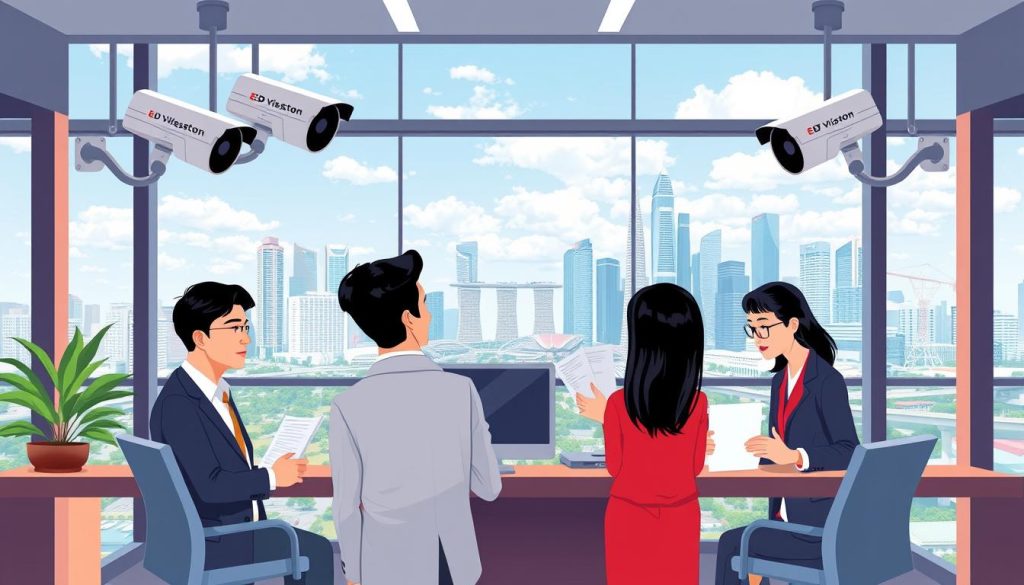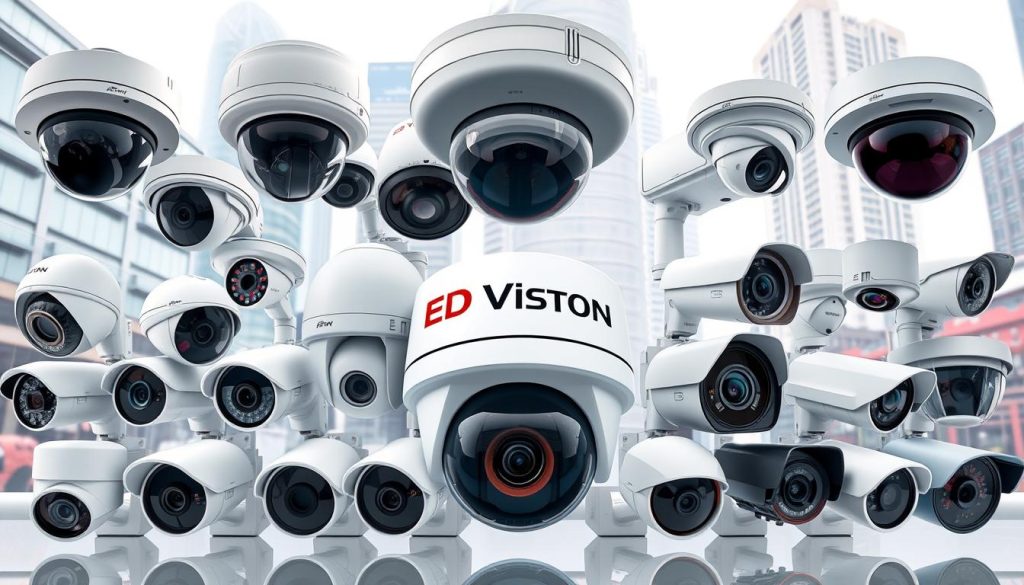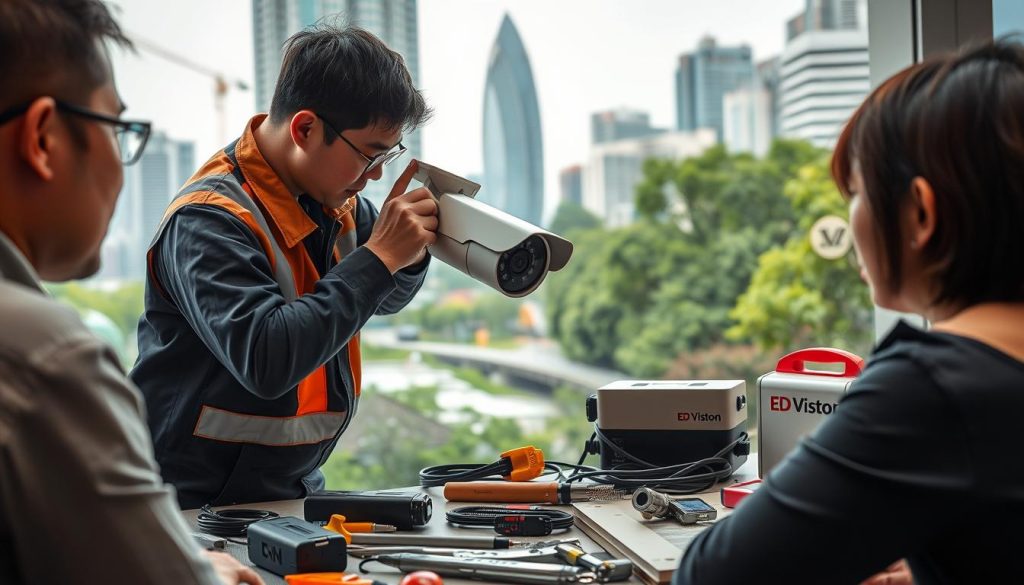How secure is your property when you can’t keep your eyes on it 24/7? Crime rates keep changing, making it key to know what to consider before installing CCTV. In a busy city like Singapore, a good CCTV system is more than just a camera. It’s about safety and security for your home or business.
Digital CCTV camera systems are becoming more popular. They offer better image quality and are easier to install. Choosing the right camera type, like dome or bullet, is also important for good surveillance.
Let’s look at what makes a CCTV system effective. Whether you own a home or a business, choosing the right approach is vital. For the latest CCTV solutions and offers, contact ED Viston today at +65 8313 4578 to learn more!
Key Takeaways
- Prioritize strategic placement of CCTV cameras to enhance effectiveness.
- Understand the advantages of digital CCTV systems over analogue systems.
- Choose the right type of camera based on the environment and needs.
- Ensure compliance with Singapore’s Personal Data Protection Act (PDPA).
- Focus on high-definition image quality for better surveillance results.
- Utilize remote viewing features to monitor premises easily.
Understanding the Importance of CCTV in Singapore
In Singapore, CCTV cameras have become very important for security. Almost one million cameras watch over the country. They help keep everyone safe and aid in solving crimes.
People living in HDB flats see CCTV as a way to fight harassment and loan sharks. Cameras make communities feel safer. They make people feel more secure.
Businesses must follow rules about using CCTV for security. It’s important to know the Personal Data Protection Act (PDPA) before setting up cameras. Getting the right permissions is key to avoid big fines.
Surveillance cameras do more than just scare off criminals. They help respond quickly to emergencies and keep staff honest. A good CCTV system gives peace of mind. It keeps properties safe and follows the law. For more information, call ED Viston at +65 8313 4578.
The Benefits of Installing CCTV Cameras
Installing CCTV cameras brings many benefits of CCTV that boost property security and give peace of mind. A visible CCTV system scares off criminals, cutting down theft and robbery. Many businesses see a decrease in crime with CCTV cameras, making a safe space for everyone.
The advantages of surveillance cameras go beyond stopping crime. They make employees work better, knowing they’re being watched. This also builds trust, leading to better business relationships.
Recorded footage helps police solve crimes like theft and vandalism. It also helps prevent workplace harassment, making the workplace safer and more respectful.
For businesses, CCTV systems can save money by not needing more security guards. You can watch your business from anywhere using smartphones and tablets. This makes keeping your property safe easier.
Top CCTV systems from HikVision and Dahua offer clear images up to 1080p. They often have cloud storage and need little upkeep. If you’re interested, check out the latest CCTV options and contact ED Viston at +65 8313 4578.
What to Consider Before Installing CCTV?
Before you install CCTV, it’s key to know what to think about. Doing a security check can spot weak spots in your property. This helps place cameras where they’re most needed.
Choosing the right cameras is also important. You might need ones that can withstand damage or work well in the dark. These choices depend on where you live and the lighting.
Legal rules are another big thing to think about. Putting cameras in private spots like bathrooms is illegal in Singapore. Always tell people about cameras with clear signs or by talking to them.
Even though you can put cameras in HDB homes or condos, getting permission is smart. This can affect who can install them.
Finding a good CCTV installer is vital. Experts can set up systems that fit your property’s needs. They help make sure everything works well together.
They also make sure cameras are wired and placed right. This helps catch everything and keeps crime away.
For specific advice on CCTV, call ED Viston at +65 8313 4578. They offer the latest in CCTV tech and deals to fit your security needs.
Legal Requirements for CCTV Installation in Singapore
It’s important for homeowners and businesses in Singapore to know the legal rules for CCTV. These rules help follow Singapore’s CCTV laws and improve security. Recently, installing corridor-facing CCTV in HDB flats is easier, thanks to new rules.
As of May 2023, you don’t need HDB approval to put cameras in your flat. But, you can’t point them at neighbors’ doors or windows to protect privacy.
Adhering to the Personal Data Protection Act (PDPA)
Companies must follow PDPA rules when using CCTV. They need to get consent for using footage. Also, they must tell people about the cameras with clear signs.
They must give access to footage when asked, but with privacy in mind. This way, they meet security needs without ignoring privacy.
Not following these rules can lead to big fines. It’s not just for homeowners but also for businesses watching employees. They must tell staff about the cameras to respect their privacy.
For the best security, using high-quality cameras is key. Companies like Wenhong provide top-notch CCTV systems. These systems are designed to be safe from tampering and vandalism.

Recent events show how important legal CCTV use is. For example, CCTV helped catch someone harming pets. It’s essential to use certified tech for installations to follow all laws.
Homeowners need permits from the Singapore Police Force and local councils for outdoor cameras. Staying updated on laws helps understand CCTV rules in Singapore better.
For more help, call ED Viston at +65 8313 4578. They offer the latest CCTV solutions and services tailored to your needs.
Location Considerations for CCTV Placement
Choosing the right spots for CCTV cameras is key to good coverage and effectiveness. Property owners need to check both indoor and outdoor areas for blind spots and weak points. Most break-ins happen through the front door. The right camera placement can really help stop crime.
Indoor vs. Outdoor Cameras
Indoor cameras watch over private and shared spaces, helping homeowners catch anyone who enters. They’re good for recording intruders but not as good at stopping them as outdoor cameras. Outdoor cameras protect the property’s entry points and perimeter, making their placement very important.
Key spots for camera placement include:
- Ground-floor doors and windows
- Main stairs or hallways
- Living areas and shared spaces
- Driveways and yards
- Garages and detached buildings
Using infrared cameras outdoors can improve video quality in the dark. Focusing on covering as much area as possible can scare burglars away from weak spots.
Common Areas and Private Spaces
When setting up CCTV, it’s important to watch common areas well but not invade privacy. Cameras in places like living rooms and hallways can boost security. But, putting cameras in private areas like bathrooms or bedrooms is illegal and a privacy breach.
For effective monitoring of common areas, consider the following:
| Area | Camera Recommendation |
|---|---|
| Front Door | Outdoor camera with wide angle |
| Living Room | Indoor camera for recording |
| Driveway | Outdoor camera with night vision |
| Garage | Indoor or outdoor camera for access tracking |
| Backyard | Outdoor camera with motion detection |
Choosing the right camera spot needs careful thought. Good lighting and hidden cameras work well but might get damaged. Getting professional advice can help set up a security system that meets your needs.
For better property security, call ED Viston today at +65 8313 4578. Learn about the latest CCTV solutions and deals.
Choosing the Right Type of CCTV Cameras
When picking CCTV cameras, several factors come into play. The main one is the purpose of your surveillance system. There are many types of cameras, each suited for different needs and places.
Fixed, PTZ, Dome, and Bullet Cameras
Fixed, PTZ, dome, and bullet cameras are among the most common. Each has its own benefits for different uses.
- Fixed Cameras: These cameras stay in one place, great for watching specific areas.
- PTZ Cameras: They can move and zoom, perfect for covering more ground.
- Dome Cameras: They are small and blend in, ideal for places where looks matter.
- Bullet Cameras: They’re good for seeing far away, with clear images.
Features to Look For: Resolution and Night Vision
When choosing CCTV cameras, look at their features. Resolution and night vision are key for good surveillance.
Choose cameras with at least 1080p resolution for clear images. For nighttime, pick systems with infrared night vision to keep watching even in the dark.
| Camera Type | Typical Use | Key Features |
|---|---|---|
| Fixed | Specific Area Monitoring | Stationary, cost-effective |
| PTZ | Larger Coverage | Pan, tilt, zoom capabilities |
| Dome | Aesthetic Sensitive Areas | Discreet, vandal-resistant |
| Bullet | Long-Range Monitoring | Excellent lens range, durable |

Choosing the right CCTV cameras and knowing their features is key to good surveillance. For help picking the best CCTV system, call ED Viston at +65 8313 4578. We’ll show you our latest options and solutions.
Factors to Think About When Getting CCTV
When you’re looking to buy CCTV systems, there are key things to consider. First, figure out what security you need. This will help you know how many cameras you need and where they should go.
Where you put your cameras is very important. You want to make sure you don’t miss anything. Look for cameras that work well in the dark and can handle the weather. Good lighting is also key to clear video, even when it’s dark.
Using the right cables and equipment is vital. Make sure your cameras are secure and won’t get damaged by the weather. After you set it up, test it often to keep it working right.
Connecting your CCTV with other security systems can make it even better. It’s also important to follow local laws about recording people. Businesses should have a plan for how long they keep video footage.
The table below shows important things to think about when choosing a CCTV system:
| Evaluation Criteria | Description |
|---|---|
| Security Needs | Identify vulnerable areas and determine necessary coverage. |
| Camera Placement | Ensure optimal angles and avoid blind spots. |
| Camera Features | Consider resolution, night vision, and weather resistance. |
| Lighting Solutions | Use motion-activated or infrared lighting to enhance footage clarity. |
| Cabling Quality | Utilize high-quality, shielded cables to maintain system integrity. |
| Maintenance | Schedule regular checks to ensure system functionality. |
| Integration | Combine with alarms and access controls for added security. |
| Legal Compliance | Adhere to local privacy regulations and data protection laws. |
For more help with CCTV solutions and deals, call ED Viston at +65 8313 4578.
Checklist for Setting Up CCTV
Installing a CCTV system is key for better security at homes and businesses. A detailed checklist helps property owners prepare well. It guides them through important steps before and during installation.
Pre-Installation Assessment Steps
The first step is a thorough pre-installation check. It finds weak spots in your property for better security planning. Here are important things to think about:
- Do a site evaluation to spot areas that need watching.
- Figure out the best spots for cameras to cover everything.
- Think about any things that might block camera views.
Following these steps makes your CCTV system work better. In fact, 95% of CCTV setups that worked well had a detailed checklist.
Permissions and Approvals Process
Before you start, getting the right permissions is essential. The rules for CCTV vary, but outdoor setups often have stricter rules. Here’s what you need to do:
- Get permits from local authorities.
- Collect all needed documents, like application forms and extra materials.
- Make sure you follow local laws and rules.
Following these steps helps avoid problems that could slow down your setup. Doing these detailed preparations helps make your CCTV system successful and effective.
For a tailored CCTV installation plan, call ED Viston today at +65 8313 4578. Find out about the latest solutions and deals to fit your security needs.
Best Practices for CCTV Installation
Following the best practices for CCTV installation boosts system performance. Proper camera placement and regular upkeep are key. They help make your CCTV system more efficient. By following these guidelines, you can cover all areas of your property effectively.
Camera Positioning Strategies
Getting camera placement right is essential. It helps avoid blind spots and ensures key areas are watched. Here are some tips:
- Focus on entry and exit points like front doors and back windows.
- Use dome cameras indoors for all-around coverage.
- Outdoor bullet cameras are best for long-distance views.
- PTZ cameras are great for busy spots, allowing for remote control.
Regular Maintenance and Footage Backup
Keeping your system in top shape is vital. Regular checks and good video management are key:
- Regularly inspect the system to make sure it works; clean camera lenses.
- Have a solid backup plan, like hard drives or cloud storage.
- Update firmware and change default passwords for better security.
For more on CCTV solutions, call ED Viston at +65 8313 4578. We offer custom solutions for your needs.
Common Mistakes to Avoid During Installation
Getting a CCTV installation right is key to good surveillance. Many people make mistakes that can hurt security. Here are some common errors to steer clear of:
- Choosing the wrong camera type: This mistake happens in 30% of commercial setups. Using indoor cameras outside or vice versa makes monitoring less effective.
- Poor camera placement: About 25% of installations have cameras in the wrong spot. This creates blind spots and reduces coverage.
- Neglecting lighting conditions: Bad lighting affects 20% of footage quality. It’s important to think about lighting when setting up cameras.
- Skipping network and power considerations: 15% of setups have problems because of overlooked network and power needs. This can mess up the system’s function.
- Neglecting system security: Weak passwords and unsecured connections make 10% of CCTV systems vulnerable to hacking.
- Underestimating storage needs: Not enough storage causes problems in 25% of installations. It can lead to losing important footage.
- Forgetting to maintain the system: Neglecting maintenance causes 20% of systems to fail. Regular upkeep is key.
- Failure to consider future expansion: 15% of installations struggle with adding new cameras. It’s important to think about future needs.
Choosing the right camera depends on its environment. Dome cameras are best indoors, while bullet cameras work well outdoors. PTZ cameras are great for covering large areas with their zoom and pan features.
Professional installation offers warranty coverage for peace of mind. Regular maintenance, like cleaning lenses and updating software, keeps your system running smoothly. Avoiding these mistakes can greatly improve your security and monitoring quality.
For the best system setup and the latest CCTV solutions, contact ED Viston today at +65 8313 4578. Learn about our current offers.
| Error Type | Percentage of Occurrences |
|---|---|
| Choosing the wrong camera type | 30% |
| Poor camera placement | 25% |
| Neglecting lighting conditions | 20% |
| Skipping network and power considerations | 15% |
| Neglecting system security | 10% |
| Underestimating storage needs | 25% |
| Forgetting to maintain the system | 20% |
| Failure to consider future expansion | 15% |
Conclusion
When installing CCTV systems in Singapore, careful planning is key. Following important tips can greatly improve your security. It’s important to know the legal rules, pick the right gear, and place cameras well.
Setting up cameras in the best spots and managing cables is critical for clear video. Also, keeping the DVR unit safe is vital for CCTV to work well. A well-installed system can scare off criminals and give you peace of mind.
For custom solutions and help with your CCTV setup, call ED Viston at +65 8313 4578. They offer the latest in CCTV tech and deals. A well-thought-out setup can boost your security and functionality a lot.
FAQ
What should I consider before installing CCTV?
What are the legal requirements for CCTV installation in Singapore?
How do I choose the right type of CCTV cameras?
What are some important factors for CCTV setup?
What is a checklist for setting up CCTV?
What are the best practices for CCTV installation?
What common mistakes should I avoid during CCTV installation?
Source Links
- https://www.valsystech.com.sg/blog/a-step-by-step-guide-to-install-your-cctv-system/
- https://www.osos.com.sg/2021/03/01/guide-to-choosing-and-using-cctv-cameras-in-singapore/
- https://web.securitysystem.com.sg/cctv-law-singapore/
- https://www.cctv-camera.com.sg/articles/dos-and-donts-of-installing-a-cctv-system-in-singapore.html
- https://www.firstsolution.com.sg/blog/how-to-legally-install-cctvs-in-singapore/
- https://www.firstsolution.com.sg/blog/protect-your-business-10-benefits-of-installing-cctv-cameras/
- https://mozabo.com/engineering/10-things-you-should-know-before-installing-your-cctv/?srsltid=AfmBOoqH_evgFmCnXuIQSIXzbWS6J7p0nGdVlsBhE3_Q4IrTzjAWjtbK
- https://www.cctvsg.net/cctv-advantages-and-disadvantages/
- https://www.cctv-camera.com.sg/articles/7-things-you-need-to-know-before-installing-cctv.html
- https://pavion.com/resource/5-things-to-consider-when-installing-cctv-monitoring-systems/
- https://sgcctv.com.sg/cctv-camera-laws-in-singapore/?srsltid=AfmBOoos0tl-wBbII2m1er-ZUJxEVcalG80MV1y9cx87KayFHFOy8idj
- https://entrycare.com/cctv-law-singapore/
- https://www.cctvsg.net/do-we-need-a-permit-to-install-a-cctv-in-singapore/
- https://www.security.org/security-cameras/placement-guide/
- https://www.caughtoncamera.net/news/best-locations-home-security-cameras/
- https://www.cctvsg.net/5-tips-on-cctv-placement-for-home/
- https://www.westerndigital.com/en-in/solutions/cctv/blog/6-things-to-consider-before-installing-cctv-cameras-at-home
- https://www.vin-services.com/guide/four-factors-to-consider-while-choosing-cctv-cameras
- https://www.linkedin.com/pulse/10-top-tips-effective-cctv-installation-swift-fire-safety
- https://ico.org.uk/for-organisations/advice-for-small-organisations/whats-new/blogs/installing-cctv-things-you-need-to-do-first/
- https://assuredlocksmiths.com.au/blog/factors-to-consider-when-installing-a-cctv-system/
- https://www.smartsecures.com/blog/cctv-camera-installation-checklist
- https://www.caldersecurity.co.uk/cctv-camera-commissioning-installation-checklist/
- https://butterflymx.com/blog/cctv-installation/
- https://www.smartsecures.com/blog/cctv-surveillance-camera-installation-how-to-secure-your-space-with-expert-tips-and-best-practices
- https://www.rkblack.com/blog/posts/view/66/11-tips-for-an-effective-surveillance-camera-system-installation
- https://www.smartsecures.com/blog/cctv-install-mistakes
- https://www.libertyuae.com/blog/mistakes-to-avoid-when-installing-cctv-cameras/
- https://krypto.com.cy/news/common-mistakes-to-avoid-when-installing-a-cctv-system/
- https://www.cctv-camera.com.sg/articles/7-important-cctv-installation-steps.html
- https://lodgeservice.com/secure-your-property-tips-for-installing-cctv/
- https://lodgeservice.com/10-essential-features-to-consider-when-choosing-business-cctv-systems/

